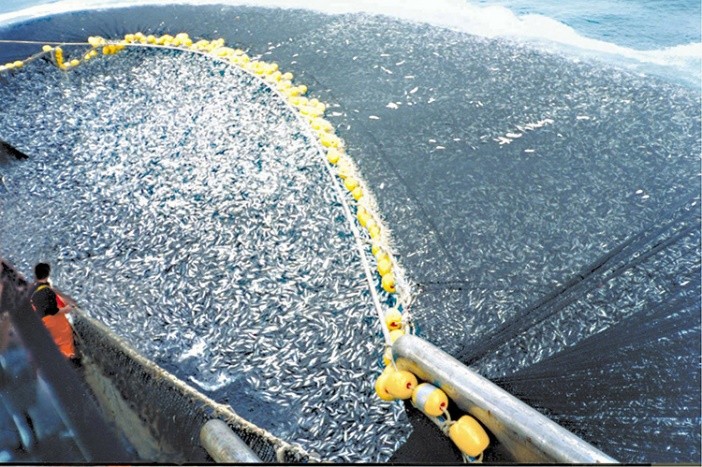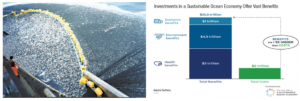
World Oceans Day: Advancing Ocean and Climate Action
- The ocean is facing vast challenges of record-breaking heat, mass coral bleaching, and a sharp rise in plastic pollution
- We depend on a healthy ocean for ecosystem services and employment in industries like tourism, shipping, and fishing
The ocean absorbs 90 per cent of excess heat, acts as the world’s largest natural carbon sink, and generates about half of all oxygen on Earth. At the same time, about two-fifths of the world’s population relies on the ocean for a portion of their animal protein intake. These benefits are not generated by seawater alone – living organisms store the carbon and produce the oxygen keeping us alive.

Photo: NOAA, WRI
However, the ocean’s ability to soak up carbon and produce food is diminishing in the face of urgent threats like heat waves and pollution. World Ocean Day is an opportunity to expand on ocean action, building on the ripple of change from the agreement of the High Seas Treaty in 2023. Under the Treaty, nations agreed to protect vast and largely unmanaged parts of the ocean that are especially vulnerable to overexploitation. This update will help deliver the 30 by 30 target of the Global Biodiversity Framework (GBF) for safeguarding the seas and the natural processes that we rely upon. How then can businesses respond to their impacts on the environment and resources?
Ocean-based industries contribute at least 3.5% of global GDP and the OECD forecasts that this will double by 2030. Overfishing endangers marine life – disrupting the balance of ecosystems, decimating fish stocks and destroying habitats. If left unaddressed, sea turtles, dolphins, sharks and other species face extinction.
Tackling the many challenges that our oceans are confronting benefits both investors and the oceans. Researchers have found that investing US$1 in ocean actions could yield at least US$5 in global benefits over the next three decades to secure ocean health and wealth. Investment opportunities supporting the transformation toward a sustainable blue economy span diverse sectors including biotechnology, energy, nature-based solutions, and more. We can meet international demand for seafood, address overfishing and protect ocean habitats by implementing sustainable aquaculture production methods with minimal impact on the environment.
In the case of marine reserves, economic benefits from increased tourism and maintenance of ecosystem services could turn a profit within as little as five years. Marine Protected Areas (MPAs) protect coastal ecosystems such as corals, seagrass beds and mangroves that are threatened by coastal development. For instance, nearby fisheries could enjoy a spillover of adult organisms and larvae dispersal. Set to reopen to the public this year following enhancement works, Singapore’s first marine park (Sisters’ Islands Marine Park) supports local marine wildlife such as the critically endangered Neptune’s cup sponge.
Ships account for about 2% of global emissions and can disrupt the natural behaviour of biodiversity. In Singapore’s quest to be a global maritime hub, the health of our coastal and marine areas is essential for the continuity of the vital services that they offer. Singapore has partnered with some of the world’s busiest ports – the Port of Los Angeles and Port of Long Beach – to establish green and digital shipping corridors. This will accelerate maritime decarbonisation via the piloting, development, and uptake of zero GHG emission technologies and fuels. In addition, keeping marine ecosystems and oceans healthy through efforts like optimising port procedures and cutting down on black carbon emissions can help to guard against declining air and water quality.
Looking forward
Ocean health directly impacts human and financial well-being. The High Seas Treaty is a pivotal opportunity to manage the oceans sustainable for the benefit of all. However, these benefits will only be realised if we invest in the technology, infrastructure and processes needed for full implementation of sustainable ocean-based activities. Investing in the ocean as a climate change solution offers a wide range of co-benefits, including protecting coastal communities from storms, creating employment opportunities, preserving biodiversity and more. To achieve this, we invest in companies that contribute to UN SDG Target 12.2 to 12.4 by minimising food losses along supply chains and reducing the release of wastes to air, water and soil. Sea use is a major driver of biodiversity loss, with ocean space facing increasing demand from diverse users. Achieving GBF Target 10 on enhancing biodiversity and sustainability in aquaculture and fisheries by 2030 will maintain the long-term productivity of these production systems needed by businesses and local communities. Prioritising sustainable ocean management is essential for a resilient future where economic development is supported by a healthy environment.
Important Information
This material is provided by Phillip Capital Management (S) Ltd (“PCM”) for general information only and does not constitute a recommendation, an offer to sell, or a solicitation of any offer to invest in any of the exchange-traded fund (“ETF”) or the unit trust (“Products”) mentioned herein. It does not have any regard to your specific investment objectives, financial situation and any of your particular needs.
The information provided herein may be obtained or compiled from public and/or third party sources that PCM has no reason to believe are unreliable. Any opinion or view herein is an expression of belief of the individual author or the indicated source (as applicable) only. PCM makes no representation or warranty that such information is accurate, complete, verified or should be relied upon as such. The information does not constitute, and should not be used as a substitute for tax, legal or investment advice.
The information herein are not for any person in any jurisdiction or country where such distribution or availability for use would contravene any applicable law or regulation or would subject PCM to any registration or licensing requirement in such jurisdiction or country. The Products is not offered to U.S. Persons. PhillipCapital Group of Companies, including PCM, their affiliates and/or their officers, directors and/or employees may own or have positions in the Products. This advertisement has not been reviewed by the Monetary Authority of Singapore.
